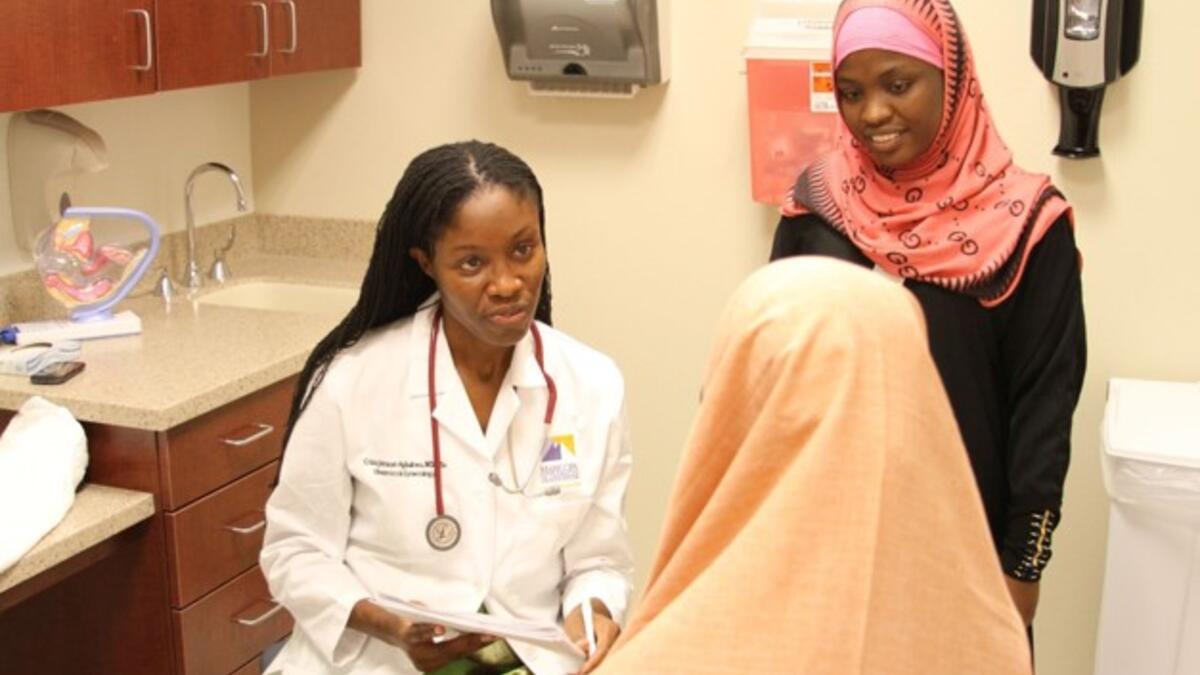ASU study: Exposure to violence means less access to health care for Somali women in Arizona

Crista Johnson-Agbakwu (seated left) and Somali cultural health navigator Owliya Abdalla (standing right) with a Somali patient. Photo courtesy of Valleywise Health, Refugee Women's Health Clinic.
Migrant women and girls who experienced violent crime are more likely than nonvictims to have health problems and face barriers to vital health care here in Arizona, a new Arizona State University study has found.
The study, published in December in the American Journal of Public Health, is a first-of-its-kind, large-scale survey of Somali women and girls in Arizona that shows the health effects of victimization, defined by researchers as homicide, violence, sexual assault, arson and kidnapping.
More than 7,000 Somalis seeking either refuge or political asylum have arrived in Arizona since 1992, the fourth-highest total of any state, according to the Centers for Disease Control and Prevention. Yet, they remain what study co-authors Kathleen A. Fox and Crista Johnson-Agbakwu of the Watts College of Public Service and Community Solutions call a hidden population.
Their research sheds light on how Somali women and girls use health care in the U.S. and points to the need for a larger, statewide discussion of health issues faced by underserved populations like the Somalis in Arizona. Research also suggests the Somalis’ largest impediments to health — transportation and child care — are solvable through subsidized child care programs, more funding for ridesharing and hiring community health care workers for hard-to-reach populations.
Many longtime Arizonans may not know that Somalis as well as nationals from several other countries have found refuge or asylum in the state, said Fox, an associate professor in the School of Criminology and Criminal Justice.
But many Somali women and girls victimized by violent acts have significantly more health problems and greater difficulties gaining access to health care compared to nonvictims, said Johnson-Agbakwu, a physician and research associate professor in ASU’s School of Social Work and the Southwest Interdisciplinary Research Center.
“There is among them a major distrust in the health care system and a disconnect among perceptions of health and wellness,” Johnson-Agbakwu said.
Somalis who are unable to speak or understand English well are also often not as knowledgeable about factors affecting their health or how to treat them, she said. Additionally, they are less likely to have a designated place to receive care in Arizona than nonvictims, and tend to rely more on emergency care, which is more costly and yields worse outcomes, she said.
“It’s a major impediment to becoming self-sufficient, healthy and productive in the U.S. for many of the female Somali refugees and asylum seekers,” Johnson-Agbakwu said.
While noting that violence against women is a “global and pervasive problem,” the researchers found that Somali women and girls in particular are at very high risk for domestic violence, child abuse and involuntary family separation.
Fox and Johnson-Agbakwu cited the World Health Association (WHO) statistics saying that female genital mutilation/cutting (FGM/C) is prevalent worldwide, with 98% of all women in girls in Somalia affected. FGM/C also puts women and girls at increased risk for obstetric and gynecological complications, as well as depression and post-traumatic stress disorder, according to the WHO.
The study also calls for Arizona health care professionals and their staffs to become better educated about culturally appropriate care for migrants; hire linguistically and gender-congruent providers and support staff; engage in community outreach to build trust and enhance health literacy; accommodate needs for child care, flexible hours and transportation for mothers of young children; and extend outreach to crime victims in both health care and community settings.
“These community health workers are cultural health navigators who can share experiences and bridge those gaps in critical ways,” Johnson-Agbakwu said.
More Science and technology

ASU researcher part of team discovering ways to fight drug-resistant bacteria
A new study published in the Science Advances journal featuring Arizona State University researchers has found…

ASU student researchers get early, hands-on experience in engineering research
Using computer science to aid endangered species reintroduction, enhance software engineering education and improve semiconductor…

ASU professor honored with prestigious award for being a cybersecurity trailblazer
At first, he thought it was a drill.On Sept. 11, 2001, Gail-Joon Ahn sat in a conference room in Fort Meade, Maryland.…